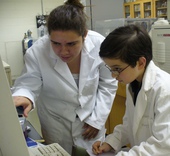Highlight
Outreach Success: Mentoring a 5th Grader
Achievement/Results
Being a part of the IGERT program offers one many opportunities, one of which is outreach. The program at the University of Kentucky requires each IGERT trainee to participate in at least 20 hours of outreach. This outreach comes in many forms from going to classes and doing demos to setting up booths at science fairs and showing different aspects of science to our future generations of scientists. It was during one of these science fairs that our IGERT trainee, Leslie Doleman first met Maudh. He was a 5th grader in Lexington who was eager to hear about what the IGERT program had to offer and he was very inquisitive of all the demos.
During this time, the IGERT trainees were trying to develop a way to determine if the people who visited the IGERT demos at the science fair would be inclined to come to the University of Kentucky Engineers’ Day where they would be showing more demos. To do this, they decided to give cards out with information about Engineers Day (E-Day) and offered a prize to the students who presented their card on E-day. Of course, Maudh was there with his card bright and early. While there, he again watched the IGERT demos with eagerness and even helped the trainees explain the demos to others.
Then, Leslie heard his mother push him to ask her something. Leslie leaned down to talk with him and he explained his science fair project to her. He was extracting DNA from different types of bananas (bananas of different sizes, different stages of ripeness, etc.) and seeing if certain bananas have more DNA than others. Leslie thought for a 5th grader, this seemed like a nice project and she was very impressed with his abilities to explain what he was doing. Leslie invited him to come into the lab to see what a lab looks like and show him what her group was doing with DNA.
Later that week, he came to the lab with his banana DNA to show what he had done. Leslie showed him various equipment used for DNA analysis including centrifuges, the sonicator, DNA gels. She also explained scientific terms that he could use during his science fair such as cell lysing. He was extremely happy to see it all and he left the lab enthusiastic about finishing his project for the regional science fair.
On the Friday before the science fair, Muadh called Leslie and asked her to attend the fair. On Saturday, Leslie went to see his poster and let him explain his project in more detail. He had wowed the judges with his knowledge of scientific terms, such as lysing cells, and also impressed them with his energy and enthusiasm. To further show him support, Leslie went to the awards ceremony. Leslie said it was so satisfying to see him excited and nervous as he waited for his category to be called. When they announced the awards in his category, he did not place and Leslie saw the look of defeat on his face. Then, they called the overall winners, and he received 3rd place overall. Leslie was ecstatic and explained to him that it was much better to get 3rd overall than to get a medal in his category because that meant out of all the projects, he was the 3rd best overall and that was impressive for a 5th grader in a 5th-8th grade category.
His principal was present and introduced himself to Leslie. He was also excited at Maudh’s victory, thanked her for mentoring him and invited Leslie to be the schools guest of honor at a fundraising dinner. Maudh now gets to go to the state science fair. Leslie continues to keep in touch with him and offer insights to his project. He has plans to come to the lab again before the science fair to try some more experiments which will strengthen his project and teach him more about DNA and how it can be used. There is no doubt that because of IGERT outreach activities, Maudh will be a great scientist or engineer some day.
Address Goals
It is important for scientists and engineers to communicate to the public how the research supported by their tax dollars will benefit the community at large. Interactions with schools, children and teachers are one aspect of this responsibility and it is closely coupled with the IGERT fellows’ training on ethical research practices. This highlight demonstrates how outreach not only influences our future scientists and engineers but also teaches our IGERT trainees the importance of their role in actively engaging the public as part of their research efforts.






